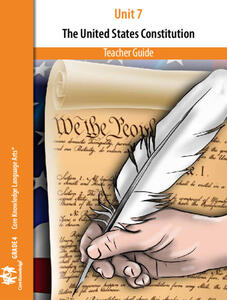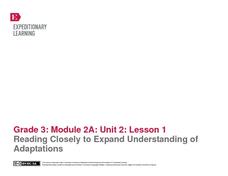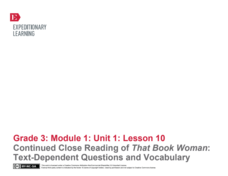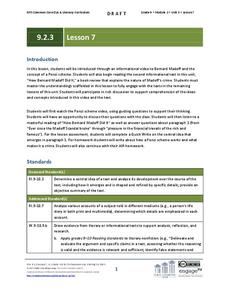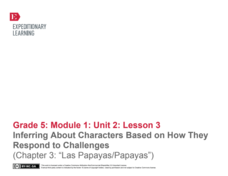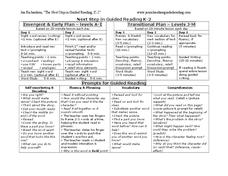Novelinks
The Tempest: QAR
Asking questions about a text is an effective way to improve reading comprehension. Apply the Question Answer Response strategy to your unit on William Shakespeare's The Tempest. As kids read each passage, they decide if the answer can...
Houghton Mifflin Harcourt
Problem Solvers: Extra Support Lessons (Theme 4)
When it comes to reading and understanding a text, sometimes readers need extra help. The third and final resource in a series of guides to accompany Theme 4: Problem Solvers provides additional activities to help struggling learners....
Texas Center for Learning Disabilities
Chapter 9 Teacher Guide and Student Log
Intended to be used with the last chapter of Tony Johnston's Any Small Goodness: A Novel of the Barrio, this packet of intervention materials is designed to improve the reading comprehension of learners with special needs.
Recorded Books
Teacher's Guide: The Pinballs
Dive your class into the novel The Pinballs by Betsy Byars with the support of this reading guide. Including short answer questions, a multiple choice comprehension quiz, and extension activities, a variety of materials are provided for...
Core Knowledge Foundation
Third Grade Skills Unit 1: Classic Tales
A unit focusing on third-grade skills explores spelling patterns, conducts a read-aloud, practices reading comprehension, and administers assessments for baseline information.
Core Knowledge Foundation
Unit 7: The United States Constitution
Fourth graders delve into the United States Constitution in a unit designed to boost reading comprehension, grammar, and writing. During each lesson, scholars read through and discuss a new chapter and work with prefixes and verbs....
Sullivan County BOCES
Reading Closely Teacher Manual
Wolves are the subject of a series of images, informational texts, videos, websites, and narratives. The activities prompt learners to use close reading skills, including reading closely for textual details, making evidence-based claims,...
EngageNY
Reading Closely to Expand Understanding of Adaptations
Third graders work to determine the main idea, recall key details, and answer questions using an informational text on the topic of animal adaptations. Using the non-fiction text "Staying Alive: Animal Adaptations" (provided) the teacher...
EngageNY
Close Reading of Bullfrog at Magnolia Circle: Main Ideas about the Bullfrog
As your class reaches the end of the book Bullfrog at Magnolia Circle, the seventh lesson in this literary unit helps third graders transition from reading narrative to expository writing. Scholars develop their note-taking skills as...
EngageNY
Continued Close Reading of That Book Woman: Text-Dependent Questions and Vocabulary
Explicitly explained and delightfully detailed are two ways to describe this tenth lesson plan in a larger unit designed for the first few weeks of third grade. Learners continue to use and develop previously learned close reading...
EngageNY
Mid-Unit Assessment: Close Reading of Bullfrog at Magnolia Circle: Bullfrog Life Cycle
The sixth lesson plan in this Bullfrog at Magnolia Circle unit assesses your third graders' ability to read and understand informational text. The included assessment asks learners to take notes about the main idea and supporting details...
EngageNY
Continued Close Reading of Rain School: Text-Dependent Questions and Vocabulary
The engaging story Rain School is further explored in the third lesson of a larger unit that explicitly teaches close reading skills by answering questions whose answers can only be found inside the text. Through teacher modeling and...
EngageNY
Grade 9 ELA Module 2, Unit 3, Lesson 7
After viewing an informational video that introduces Bernard Madoff and the concept of a Ponzi scheme, class members begin reading "How Bernard Madoff Did It," Liaquat Ahamed's New York Times book review that explains Madoff's crime, and...
Louisiana Department of Education
The Lion, The Witch, and The Wardrobe
Compare and contrast popular works of fantasy literature with an in-depth reading comprehension unit. Language arts learners study the theme of good versus evil, fantastical characters and symbols, and the value of a visual...
Achieve3000
Listening for Main Idea and Supporting Details
Did you hear that? It's the main idea! Teach your class listening and note-taking strategies for determining the main idea by following the steps provided in this plan.
EngageNY
Inferring About Characters Based on How They Respond to Challenges (Chapter 3: "Las Papayas/Papayas")
Start off your day with a quick reading comprehension quiz about chapter three of Esperanza Rising by Pam Muñoz Ryan. After they complete the quiz, pupils participate in a discussion and look closely at the text. A strong Common Core...
Wisconsin State Reading Association
Next Step in Guided Reading
Here are three guided reading lesson plan templates; each designed to meet the needs of a specific level of readers. Levels in focus are emergent, early, and transitional readers. Additionally, prompts to support your small group...
Core Knowledge Foundation
The Ancient Roman Civilization Tell It Again!™ Read-Aloud Anthology
A read-aloud anthology presents texts about the ancient Roman civilization. Lessons introduce readings, followed by a discussion and extension activities—word work, comprehension practice, and more. Writing focuses on opinion pieces, and...
Core Knowledge Foundation
The Five Senses Tell It Again!™ Read-Aloud Anthology
Young readers explore the five senses with a read-aloud anthology. Each lesson follows the routine of introducing the reading, listening to a read-aloud, answering comprehension questions, then practicing a skill. Modification and...
Core Knowledge Foundation
Astronomy Tell It Again!™ Read-Aloud Anthologys
A read-aloud anthology focuses on astronomy. Each week for three weeks, first graders are introduced to and listen to a text, answer comprehension questions, then complete extensions that include a learning activity and skills practice....
Core Knowledge Foundation
The War of 1812 Tell It Again!™ Read-Aloud Anthology
A read-aloud anthology consists of eight lessons about the War of 1812. Over 12 days, pupils listen to and discuss readings, practice word work, then complete extension opportunities designed for the class and home. Assessments gauge...
Core Knowledge Foundation
Classification of Animals Tell It Again!™ Read-Aloud Anthology
Animal classification is the theme of a three-week read-aloud anthology. Scholars listen to and discuss a reading and complete extension activities throughout nine lessons. Writing opportunities delve deep into the process of writing an...
Core Knowledge Foundation
The Human Body—Systems and Senses Tell It Again!™ Read-Aloud Anthology
Nine lessons over three weeks explore the human body through read-alouds. Third graders listen to and discuss a reading followed by extension activities, including word work and comprehension practice. Learners draft a narrative essay.
Core Knowledge Foundation
Fairy Tales Tell It Again!™ Read-Aloud Anthology
A read-aloud anthology explores the fantasy worlds of fairy tales. Thirteen lessons challenge scholars to listen to and discuss a text, complete word work, then participate in extension activities—assessments and culminating activities...
Other popular searches
- Guided Reading Comprehension
- Reading Comprehension Skills
- Reading Comprehension Games
- Oral Reading Comprehension
- Comprehension Strategies
- Silent Reading Comprehension
- Esl Reading Comprehension
- Poetry Reading Comprehension
- Reading Comprehension Passages
- Reading Comprehension Activity
- Science Reading Comprehension
- Reading Comprehension Test







